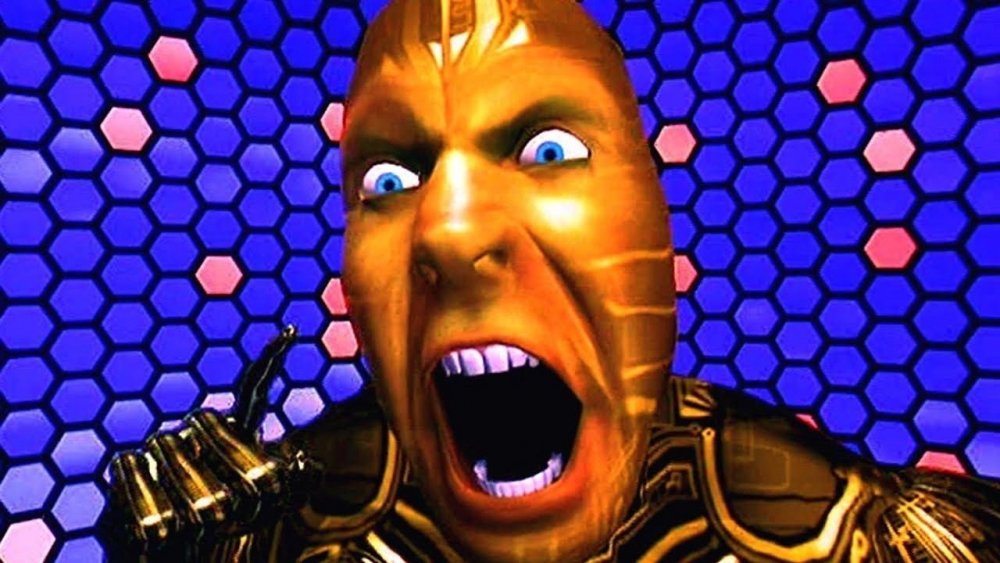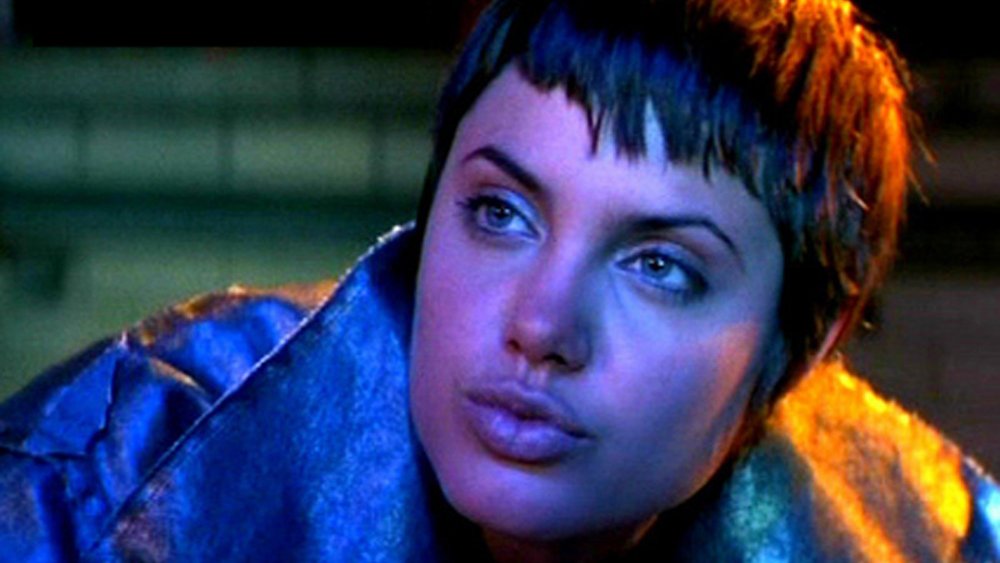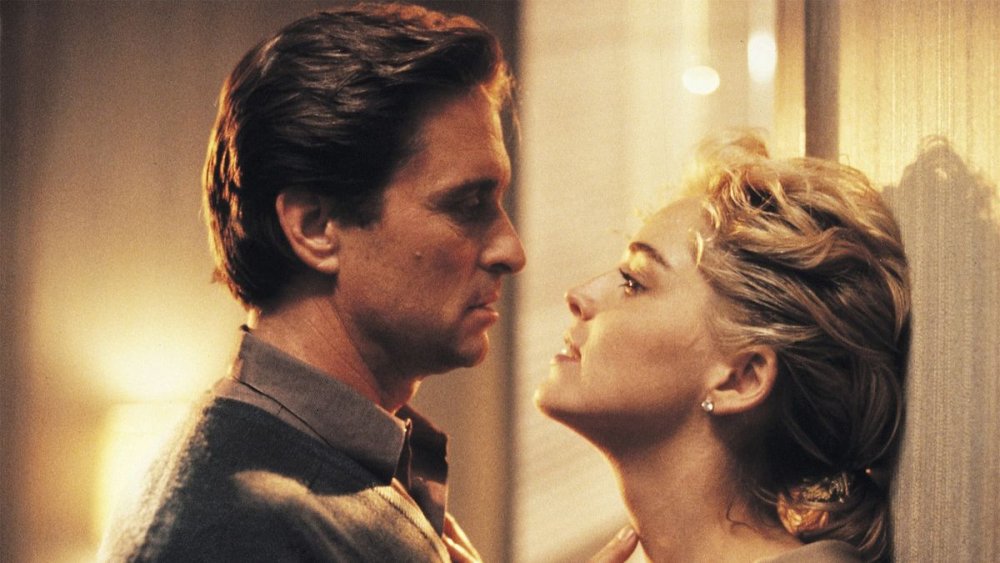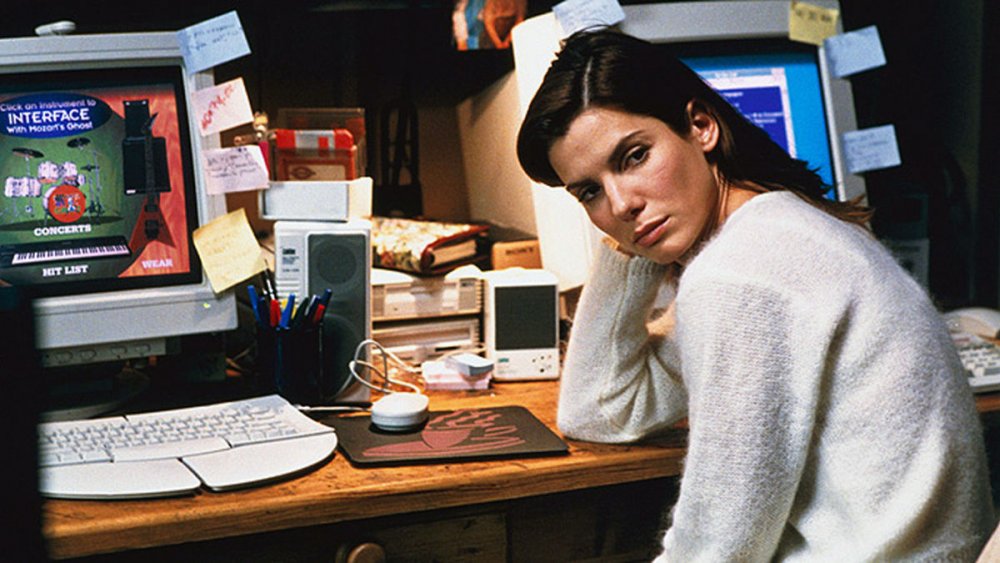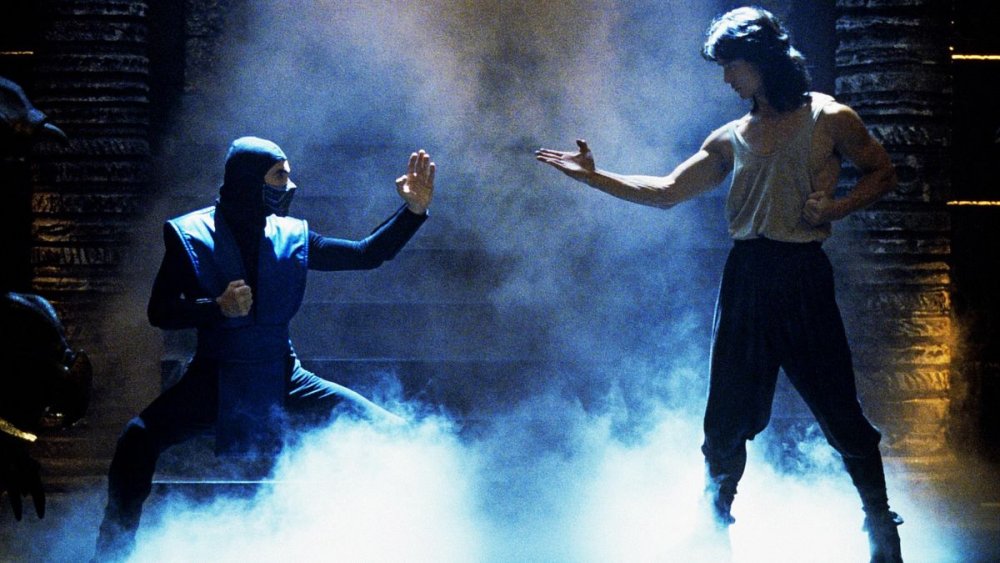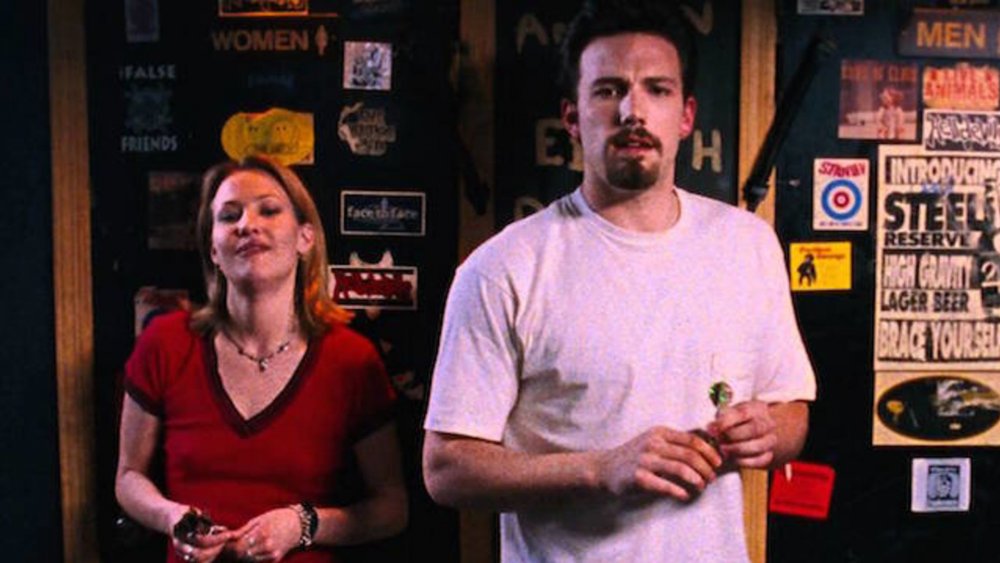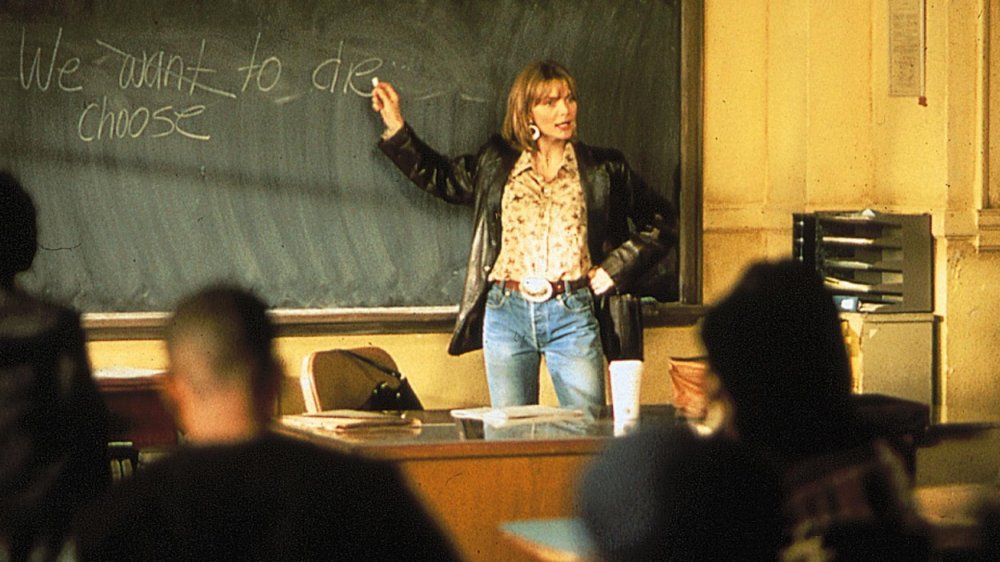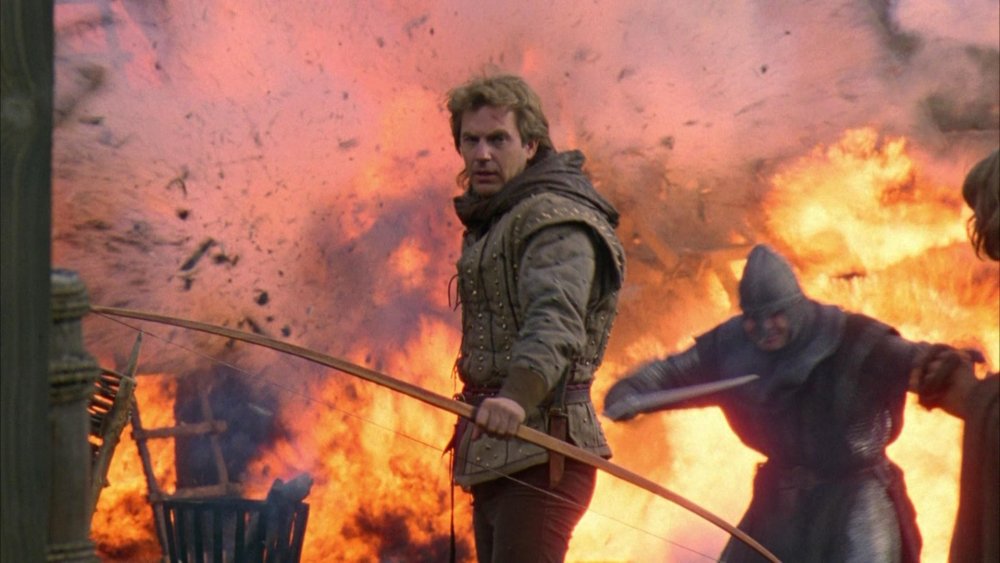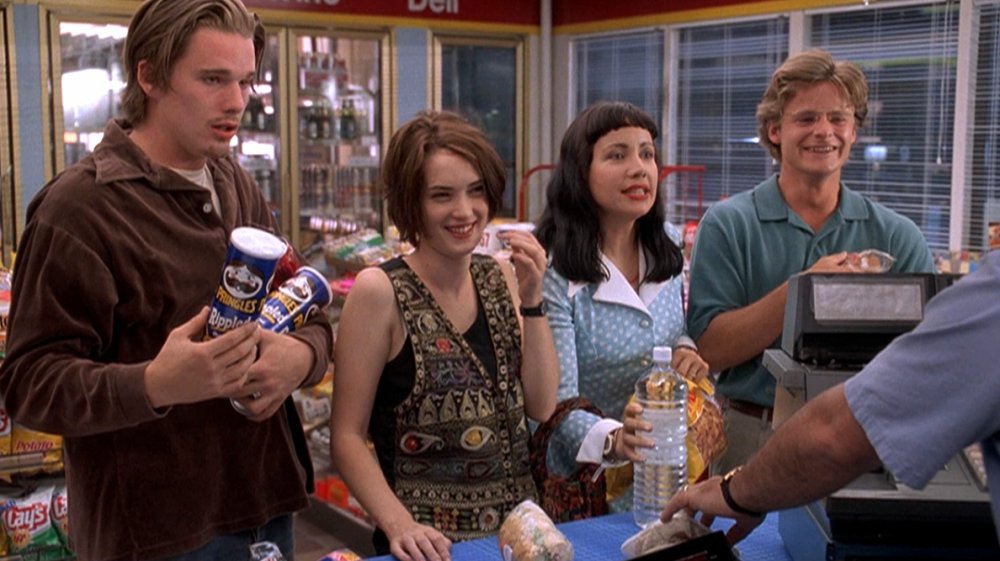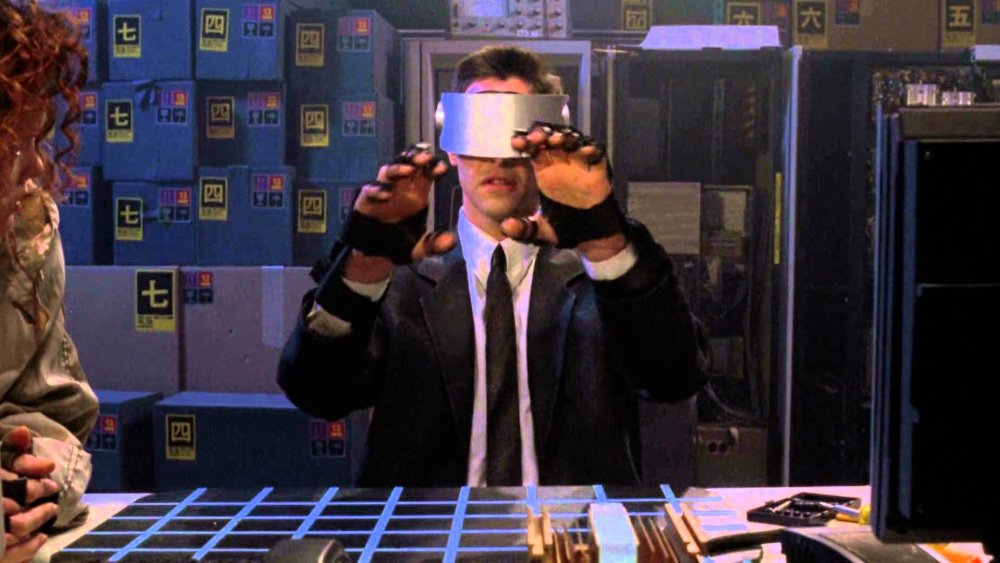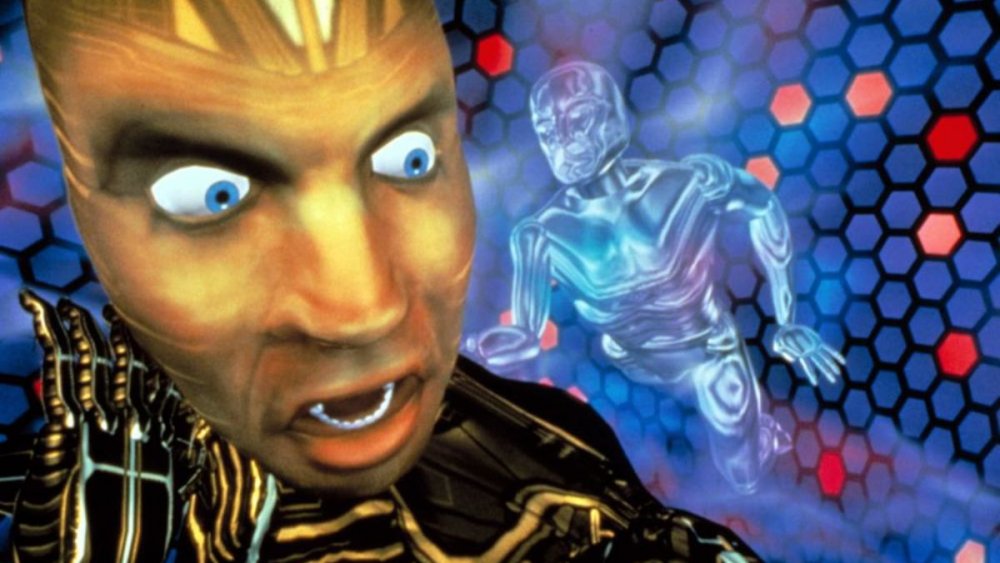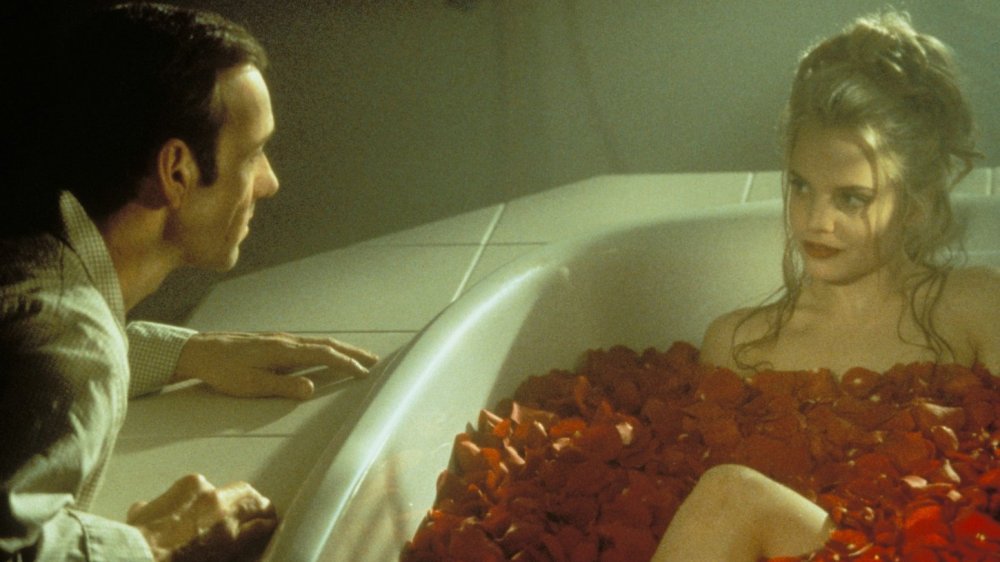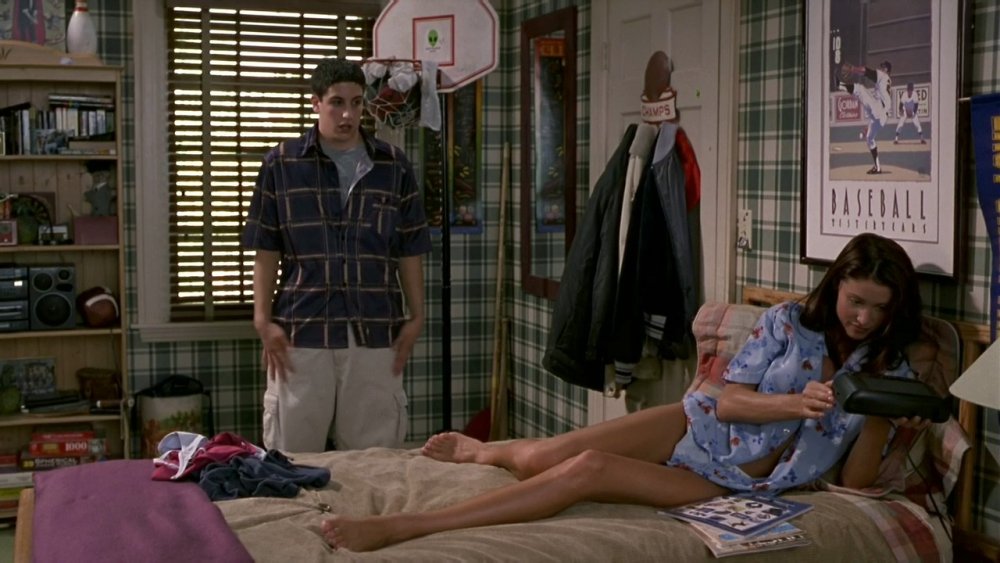'90s Movies That Didn't Age Well
The 1990s were marked by a huge shift in technology — the rise of the internet, the innovation of gaming, the birth of Netflix. Things that we now view as commonplace were just beginning to get their footing in the '90s. It was a period of time that, for many, was both analog and digital, and that sentiment was reflected in filmmaking. Computer advancements paved the way for cinematic masterpieces that could never have been dreamed of before. Movies like Jurassic Park, Terminator 2, and Toy Story all represented the heights that movies could achieve.
But the '90s weren't all CGI and action. It was also a huge decade for indie films, teen rom-coms, and dark thrillers. Many of the films produced during that decade hold up to this day, but other films are, sadly, so of their time that there's little reason to revisit them, save for a quick dose of nostalgia. And then there are those that are so bad, either in terms of technology or content, that the best course of action is to simply throw them onto the top of a trash heap and say your goodbyes. From sci-fi to prestige dramas, here are some '90s films that haven't aged well.
Hackers is a '90s movie that didn't get the internet
Released at the very onset of early internet culture — Windows 95 had made its way into consumers' hands only a month prior — Iain Softley's Hackers isn't just an ode to the Oregon Trail generation. It's a bright, shiny encapsulation of mid-'90s computer technology, in all its rollerblading glory. The film centers on a group of teen hackers in New York, led by Dade "Zero Cool/Crash Override" Murphy (Johnny Lee Miller) and Kate "Acid Burn" Libby (Angelina Jolie). Along with their friends "Cereal Killer" (Matthew Lillard), "Lord Nikon" (Laurence Mason), and "The Phantom Phreak" (Renoly Santiago), Dade and Kate unite a worldwide network of hackers to take down Ellingson Mineral Company computer security officer Eugene "The Plague" Belford (Fisher Stevens) and Secret Service Agent Richard Gill (Wendell Pierce).
Hackers worked in 1995, if for no other reason than the fact that the internet was still such a new commodity. Many households had little to no interaction with the world wide web outside of a few AOL emails, and the idea that the internet actually looked like something — in the case of Hackers, it's a mix of virtual cityscape and those old Magic Eye posters — was totally believable because people had no idea that it didn't actually look like anything. Add to that a group of high schoolers who exemplify the very height of '90s rave fashion, and you've got a film that's pretty impossible to watch outside of nostalgia's sake.
Basic Instinct is pretty offensive by modern standards
For many, Paul Verhoeven's Basic Instinct is a memorable erotic thriller that showcases the evolution of sexuality portrayed in Hollywood. Sharon Stone plays Catherine Tramell, a bisexual crime novelist/probable ice pick killer who sets her sights on San Francisco homicide detective Nick Curran (Michael Douglas), the man in charge of the investigation in which Catherine just happens to be the main suspect. The two begin an illicit affair, marked by jealous lovers and general suspicion.
But pull back all of the innuendo and steamy Catherine/Nick encounters, and you're left with a film that, in spite of putting itself out there as a boundary pusher, is little more than Showgirls with a better cast (Showgirls, incidentally, was also directed by Verhoeven). Its depiction of romantic relationships is problematic at best. Typical sexual proclivities are judged to be abnormal — Joe Eszterhas, the film's writer, clearly had no understanding of what exactly "sadomasochism" was. A scene involving Nick and his former flame, police psychologist Beth Garner (Jeanne Tripplehorn), borders on — if not totally dives into — rape. At the time of its release, Basic Instinct was plagued with protests from the LGBTQ+ community who claimed it was "the most blatantly misogynistic film in recent memory," specifically in terms of its portrayal of lesbians, who were written as "psychopaths and man-killers." It's a poor depiction of sexual freedom, but it's an even worse view of the LGBTQ+ community as a whole.
The Net's depiction of online life hasn't aged well
Like Hackers, 1995's The Net was a reflection of a time when it was clear that Hollywood had no idea what the internet was actually like. Unlike Hackers, however, The Net took a far less optimistic approach to computers. In this film, systems analyst Angela Bennett (Sandra Bullock) stumbles upon a cyber conspiracy that revolves around the use of a computer security system called Gatekeeper. Once involved, Angela becomes the target of Gregg Microsystems, the software company that owns and operates Gatekeeper. Her identity is erased, replaced with that of a woman wanted by the FBI for, among other things, prostitution. It's a movie that spends two hours trying to make a piece of malware look like it can take down the entire US government.
The Net also buys into the idea that people who work with computers are unable to also have social lives. The biggest problem for Angela once she loses her identity is that she's unable to convince anyone of who she is because she doesn't actually talk to anyone in the real world. Her entire life exists online, from any sort of meaningful social interaction to ordering pizza. In 1995, that was a potential death sentence. Today, it's Twitter and GrubHub.
Mortal Kombat has some incredibly bad '90s effects
The early '90s wasn't kind to video game adaptations. Super Mario Bros. failed to impress, and star Bob Hoskins famously called the film "the worst thing [he] ever did." The following year, both Double Dragon and Street Fighter fared even worse, with one critic calling the former a "low-IQ futuristic slugfest," while the latter was marked by its inability to live up to its source material.
As for Mortal Kombat, which hit theaters in August 1995, it stuck pretty close to the original game's narrative. Three Earthrealm fighters — Liu Kang (Robin Shou), Johnny Cage (Linden Ashby), and Sonya Blade (Bridgette Wilson) — are recruited by god of thunder Rayden (Christopher Lambert) to fight against Shang Tsung (Cary-Hiroyuki Tagawa) and the invading forces of Outworld in an inter-dimensional tournament. It's a simple plot, but it was a simple game, and at the time of its release, it all sort of worked.
Looking at it now, though, through the lens of over 25 years' worth of technological advancements and — apparently — improvements in scripting, Mortal Kombat is a complete cheesefest that's difficult to sit through without laughing. The dialogue comes across like parody, with Shang Tsung's over-the top-villainous one-liners of particular note. But the worst offense here is the effects, which were, by 1995 standards, passable. Today, though, let's just forget all about Scorpion's palm spear.
Chasing Amy was progressive for the '90s ... but not so much today
The 1997 rom-com Chasing Amy tells the story of Holden McNeil (Ben Affleck), a comic book artist who falls in love with fellow artist Alyssa Jones (Joey Lauren Adams). There is, however, one difficult obstacle in the way of Holden's pursuit of her: Alyssa is a lesbian. Ultimately, the pair do embark on a romantic relationship, but it's plagued with issues — specifically, Holden's insecurity in finding out he isn't the first man Alyssa has been with. Upon its release, the film was lauded for its progressive approach to sexuality and relationships, and it earned Smith an Independent Spirit Award for his screenplay.
But Chasing Amy isn't without its flaws. The film has come under fire for perpetuating an idea that a woman who identifies as a lesbian just needs to find the right man in order to go straight, and that if a guy tries hard enough, he can convince any woman to fall in love with him, regardless of her sexual preference. In an interview with BuzzFeed News, Guinevere Turner, the real-life inspiration for Alyssa's character, noted that she understands the aversion newer audiences might have toward the film, but she defends it for being one of the first to portray a lesbian character with "a complicated sexuality." Probably the biggest fault with Chasing Amy, then, isn't that Alyssa falls for Holden ... it's that the film sort of maintains the idea that there are only two sexualities, when sexuality is often much more fluid.
Dangerous Minds has aged terribly
Dangerous Minds, the Jerry Bruckheimer-produced adaptation of LouAnne Johnson's autobiography My Posse Don't Do Homework, wasn't exactly a winner with critics upon its release in 1995. The film, which stars Michelle Pfeiffer as the aforementioned Johnson, tells the story of a former Marine who takes a job teaching kids in an inner-city California high school. Although she struggles at first, LouAnne is eventually able to reach her students via a combination of candy, karate, and Bob Dylan. The film was initially met with harsh criticism, with reviewers calling it "stereotypical" and "patronizing." Regardless, it managed to do well at the box office, bringing in nearly $15 million its opening weekend.
Today, there is little about Dangerous Minds that is redeemable. It's a prime example of Hollywood's use of the "white savior" trope, where a white hero serves to rescue a group of impoverished minorities. We've seen it time and time again, more recently with 2009's The Blind Side, which went on to receive an Oscar nomination for Best Picture. But Dangerous Minds is by far one of the worst offenders. If not for the film's supporting cast, who managed to deliver some great performances in spite of the material, the film is utterly unwatchable by today's standards.
Robin Hood: Prince of Thieves isn't so merry, man
The tale of Robin Hood dates back to the Late Middle Ages, so it's understandable that certain aspects of its story could feel a little out of touch with modern audiences. The problem with Robin Hood: Prince of Thieves, the 1991 film adaptation starring Kevin Costner as its very far-from-English titular character, is that the parts of the movie that feel the most outdated — and just generally cringey — have nothing to do with the original folktale but are instead additions exclusive to the movie.
Put aside the film's lengthy runtime (two and a half hours theatrical, but there's a three-hour director's cut out there that's even more unnecessary) and its ridiculously bad performances from a cast of otherwise well-respected and talented actors, and Robin Hood: Prince of Thieves is still a movie that doesn't know whether it wants to be a serious drama or a kids' action flick. Oh, and then there's the subtle racism and religious intolerance surrounding Morgan Freeman's character, Azeem, and that one scene where the Sheriff of Nottingham (Alan Rickman) comedically attempts to rape Lady Marian (Mary Elizabeth Mastrantonio) while simultaneously forcing her into marriage.
The film tries to promote equality and acceptance (Azeem's line about "Allah loves wondrous variety" being a prime example), but the message falls flat. Azeem is still a man who's put into a position of servitude, even though he's arguably more intelligent and capable of leading than Robin himself.
In Reality Bites, Troy is terrible
For anyone entering into adulthood in the mid-'90s, Reality Bites was pretty much considered required viewing. Centering on the post-college lives of four friends — Lelaina (Winona Ryder), Troy (Ethan Hawke), Vickie (Janeane Garofalo), and Sammy (Steve Zahn) — who live together in Houston, the film was a perfect encapsulation of the era and the disenfranchised youth that made up Generation X. In 1994, having no direction in life and a combative-type attitude toward your friends was kind of attractive, so long as you could write terrible coffeehouse poetry and talk for hours about important social and moral issues while chain-smoking a pack of Marlboro Reds. Today, you'd probably get dropped from your friend group.
We're specifically talking about Troy here because looking at Reality Bites through a modern lens makes one thing perfectly, painfully clear — Troy was the absolute worst. The '90s were shockingly forgiving of some pretty unforgiving behaviors, especially when it came from a guy in a loose button-down with unkempt hair and a crooked smile. But he's an artist, we'd say. Troy was an artist, sure. He was also narcissistic, emotionally manipulative, and just kind of mean. The "don't flatter yourself" line post-"I love you" confession is just one example of many. And while guys like Troy continue to exist in cinema today, they generally don't get the girl in the end because the girl has had enough of Troy's garbage.
Johnny Mnemonic did a bad job predicting future tech
Four years before Keanu Reeves took on the role of Neo in the Matrix trilogy, he played Johnny, the mnemonic courier turned internet hero in Robert Longo's cyberpunk sci-fi thriller Johnny Mnemonic. In Longo's film, information is currency, and people like Johnny have data storage devices implanted into their brains for the express purpose of transferring sensitive information across "the Net" for various corporations and organized crime circuits. When Johnny's latest package happens to contain the cure for a neurological disease caused by using the internet, he's forced into a fight not only with the head of a pharmacological company that wants it for himself but also with the Yakuza.
As entertaining as Johnny Mnemonic is (and watching Reeves' Johnny team up with a cast that included Ice-T and a cybernetic porpoise is endlessly entertaining), it's hard to ignore just how bad the film's depiction of future tech — in this case, 2021 — is. In order to access his brain's hard drive, Johnny enters into a VR world through the use of a giant visor, a pair of gloves that look something like high-tech protective padding, and a fax machine. Because in 2021, the best and fastest way to transmit information still involves dial-up. Longo probably meant for Johnny Mnemonic to be some kind of statement on society's inevitable enslavement to technology, but it's hard to buy into that when VCRs play a huge role in the vision.
The Lawnmower Man is a sci-fi film that hasn't aged well at all
The Lawnmower Man, Brett Leonard's 1992 not-quite-adaptation of a Stephen King story, has little to do with its source material and even less to do with actual reality. The film stars Pierce Brosnan as Dr. Lawrence Angelo, an employee of the nefarious Virtual Space Industries who's been tasked with developing neurologically enhanced killer chimpanzees to be used for combat by the US government. When one of the chimps gets loose, Leonard turns his attention to human experimentation, recruiting the developmentally disabled Jobe Smith (Jeff Fahey) as his next test subject. As one can imagine, things go horribly wrong, culminating with Jobe becoming a telekinetic superhuman with full control over virtual reality.
The graphics here are, understandably, incredibly awful. It was the early '90s, before Hackers or The Net were even in development, so The Lawnmower Man winds up looking like a cheaper TRON or one of those educational CD-ROM games from your childhood. The bonus here is that we also get one of the first instances of a VR sex scene, for whatever that's worth. Maybe worse than its graphics, though, is the film's handling of Jobe's disability. Fahey plays the character early on more like a caricature than an actual person, with his performance calling to mind Tropic Thunder's Simple Jack.
While it was huge in the '90s, American Beauty is all sorts of awful
American Beauty is something of an anomaly here in that it took home five Academy Awards, sweeping most of the major categories. At the heart of the film is Lester Burnham (Kevin Spacey), a middle-aged magazine exec whose life is anything but fulfilling. When it all starts to unravel — his wife, Carolyn (Annette Bening), begins an affair just prior to him losing his job — Lester embarks on a path of self-discovery and improvement, one that also happens to include actively pursuing his daughter's best friend, Angela (Mena Suvari).
While that particular storyline is 100% cringeworthy, it's also something that's been explored more than a few times in cinematic history (Lolita, The Crush). As bad as it may be on its own, what makes this one especially awful to watch is the shadow of Spacey's personal life that looms so heavily over it, and subsequently, over every other role he's had on screen. Following a series of sexual assault allegations from over 30 victims, Spacey's career has been tainted, and trying to sit through an on-screen flirtation between him and a young woman is anything but entertaining.
American Pie is pretty vulgar ... especially that one 'joke'
The summer of 1999 was a wild time in our nation's history. George W. Bush announced he'd be running for president, Woodstock made a comeback, and George Lucas tried his hand at recapturing the magic of Star Wars. Nestled into the chaos was a film that would go on to define an entire generation and one that would have a slew of sequels and spinoffs: American Pie. The raunchy teen comedy made waves with its graphic depiction of coming-of-age hilarity, and it also launched the careers of a number of actors. Some went on to have continued success while others ... not so much.
American Pie has no shortage of vulgar jokes and tasteless scenes, but there's one in particular that makes it completely unwatchable today. When Jim's (Jason Biggs) friends convince him to set up a webcam in his room so they can watch foreign exchange student Nadia (Shannon Elizabeth) undress, the act is treated like any other joke in the film, one that supposedly gets funnier once Jim decides to join in. Nowadays, the same sort of joke would be punishable by a hefty fine and jail time. Filming someone without their consent isn't funny. The fact that Nadia winds up being the one who gets punished for it (she loses her sponsorship over of it) is even worse.
